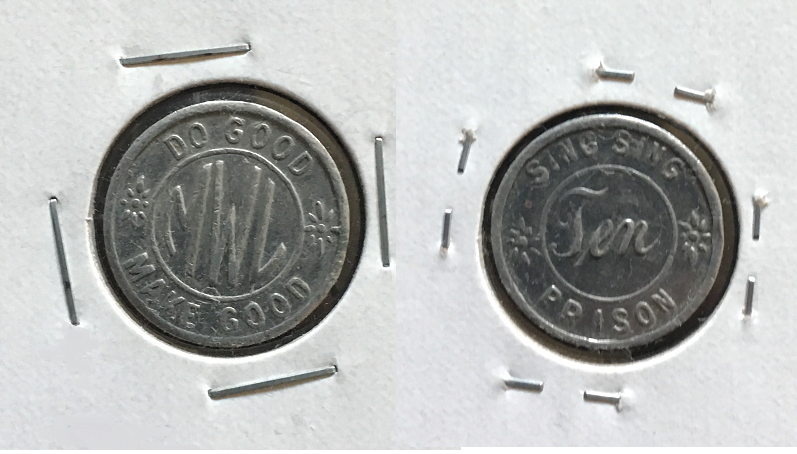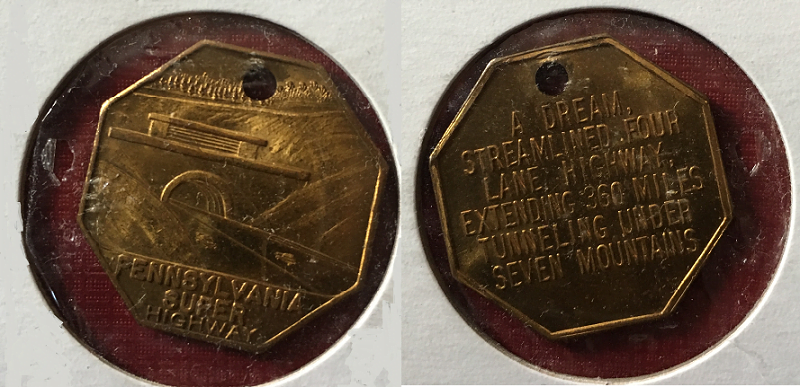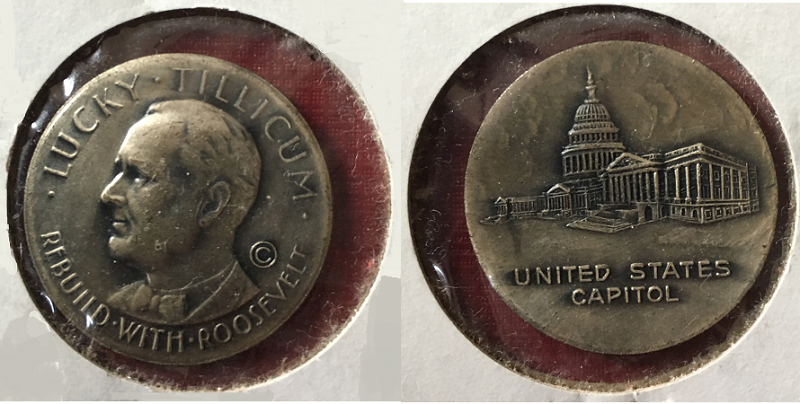I’ve talked about the coins I didn’t (or, rather, couldn’t) buy during my recent trip to the ANA World’s Fair of Money. So what about the ones I did buy?
As with the Schaumburg show that I attended in April, I was completely overwhelmed by all of the dealers on the bourse who all seemed to have cases full of Morgan Dollars and gold Double Eagles and found myself drawn to the ones who stood out from the pack.

One such dealer had several different types of prison tokens for sale. I bought this one, which was issued at the infamous Sing Sing prison, a maximum security facility located in Ossining, NY. Home to such well-known inmates including Julius and Ethel Rosenberg, David “The Son of Sam” Berkowitz, Albert Fish and “Sopranos” star Tony Sirico, the prison was responsible for giving us the phrase “up the river” to describe someone getting sent to prison (Sing Sing is located up the Hudson River from New York City).
This particular token is similar to the “Tombs” token I got in Schaumburg in that both coins have simple designs that place a premium on utility over aesthetics. Worth ten cents, it’s similar in size to its outside world counterpart, the dime. The Sing Sing token bears the initials “MWL” on the obverse, which stands for Mutual Welfare League. According to the New York Times, the League took a more holistic approach to running the prison than what others had done in the past, emphasizing inmate self-sufficiency and promotion of non-recidivism. That probably explains the inspirational slogan on the obverse: “Do Good, Make Good.” It’s kind of hokey, but I guess it worked. According to the Times, within the MWL’s first week in charge at Sing Sing, “prisoner morale skyrocketed and Sing Sing recorded the first infraction-free 24 hours in its history.” Apparently, things had gone a little too smoothly – within a year, the New York Superintendent of Prisons forced the MWL out of Sing Sing, accusing them of coddling prisoners. I guess they preferred the good old days, when people would stab each other with homemade prison shanks.

I bought this token for obvious reasons. As a born-and-bred Pennsylvanian, I’ve spent many hours on the PA Turnpike, watching the miles and miles of farmland and the dilapidated, burnt-out barns advertising Mail Pouch chewing tobacco while living in fear of missing my exit and having to go a half-hour out of my way because there’s 15-20 miles between each exit.
According to the dealer I bought from, this is actually a keychain fob from the 1950s. The earliest one of these I found online was from 1946, so this one is, obviously, a later model. Overall, this one was in nice condition and I’ll keep it on me for the next time I’m stuck in traffic on the Turnpike.


Finally, I got these two tokens because of their relation to a fascinating time in American history. This “lucky tillicum” was one of several such tokens issued by Franklin D. Roosevelt’s presidential campaign in 1932. Using a portrait of FDR that ended up being somewhat similar to the one that would adorn the future U.S. dime, these tokens helped hammer home the central theme of his campaign: happy days were here again. After winning gigantic landslides in 1932 and 1936, he was the most powerful politician in recent memory. He had gigantic, veto-proof majorities in both houses of Congress and his New Deal was slowly making progress in helping the country recover from the Great Depression.
The only obstacle was the Supreme Court. Dominated by laissez-faire conservatives, the Court had struck down several pieces of New Deal legislation as unconstitutional. FDR reacted to these setbacks as any popular, seemingly invincible President would: proposing a bill to add additional justices to the Supreme Court. The specifics of the bill called for an additional justice appointed for each justice over 70 years-old for a maximum of six new judges. As it happened, the four most conservative justices on the court (along with one of the two swing votes) were over 70. I’m sure that was just a coincidence.
The so-called “Court Packing” bill (officially the “Judicial Procedures Reform Bill of 1937”) was instantly controversial and engendered lots of opposition. One of the groups that sprouted up to fight the bill was the Citizens’ Committee for Court and Constitution. I wasn’t able to find out too much about them online, other than this April 23, 1937 article from the Rochester Democrat and Chronicle reporting that the group was set to host a speech by U.S. Senator Burton K. Wheeler (D-MT), the longtime progressive who was helping lead the charge against Roosevelt and the court packing bill. According to Jeff Shesol’s Supreme Power, while Wheeler genuinely opposed the bill as a dangerous step towards tyranny, he also had personal reasons for wanting to take on FDR – not the least of which was that he had desperately wanted to be FDR’s vice president but was passed over in favor of U.S. Speaker of the House John Nance Garner (the guy who once said the vice presidency “wasn’t worth a bucket of warm piss”).
Ultimately, Wheeler and his allies would carry the day, as the bill died in the Senate and may have taken FDR’s loyal sherpa in the Senate, Majority Leader Joe Robinson, with it. FDR’s aura of invincibility was gone and Southern and conservative Democrats finally felt emboldened to take him on after years of loyal, intimidated servitude. Of course, FDR ended up having the last laugh. Turns out, targeting older justices was a smart political move since they started dropping like flies once the bill was officially kaput. The president would end up appointing 9 justices (more than any other president besides George Washington), including a new Chief Justice, and would replace all but two of the justices who were on the Court when the whole “Court Packing” saga began. No wonder FDR always seemed to have a grin on his face.

